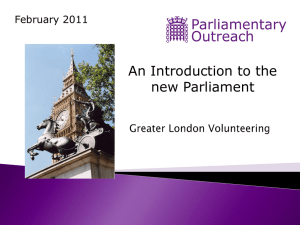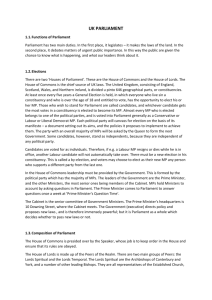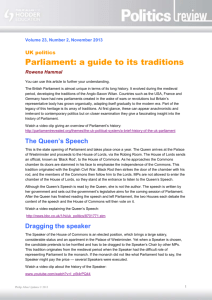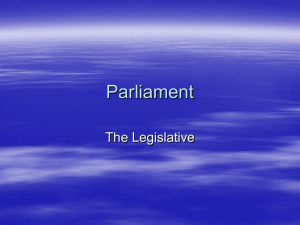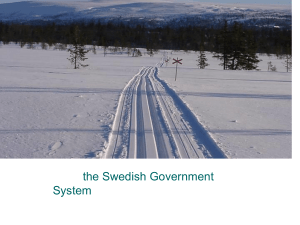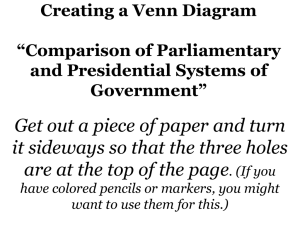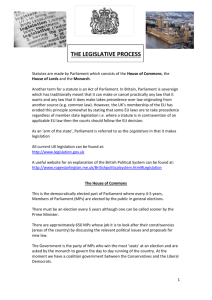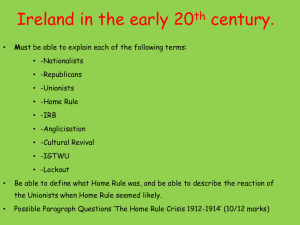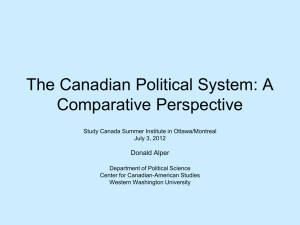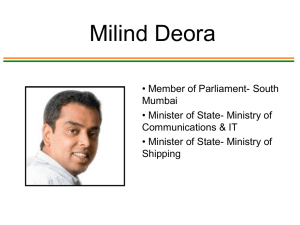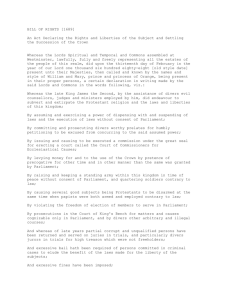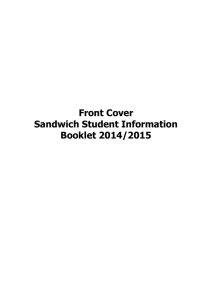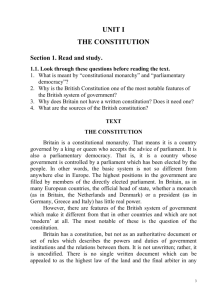Parliamentary System in the UK Introduction
advertisement
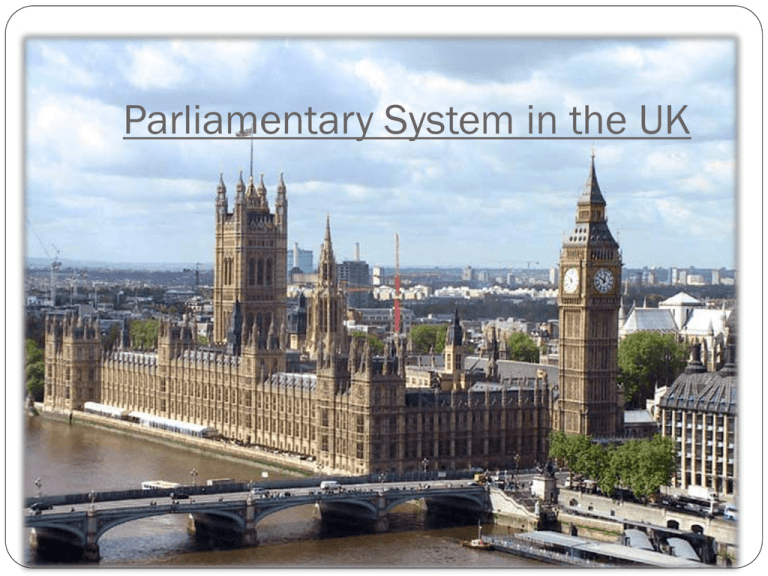
Parliamentary System in the UK Introduction Great Britain (UK) is a parliamentary democracy with a constitutional Monarch as Head of State. The principle behind British democracy is that the people elect Members of Parliament (MPs) to the House of Commons in London at a general election, held no more than five years apart. Most MPs belong to a political party, and the party with the largest number of MPs in the House of Commons forms the government. Parliament Parliament is an essential part of UK politics. Its main roles are: 1. 2. 3. Examining and challenging the work of the government (scrutiny) Debating and passing all laws (legislation) Enabling the government to raise taxes Parliament is made up of three parts: 1. 2. 3. The Queen The House of Commons The House of Lords The Queen The British Monarch, currently Queen Elizabeth II, is the Head of State of the United Kingdom of Great Britain and Northern Ireland and Her Other Realms and Territories. Executive power in the United Kingdom is exercised by the Queen via Her Majesty's Government and the devolved national authorities the Scottish Government, the Welsh Assembly Government and the Northern Ireland Executive. The Queen takes little direct part in government, and must remain strictly neutral in political affairs. However, the legal authority known as the Crown remains the source of the executive power used by the Government. Her Majesty’s Government The Government runs the country and is formed from the political party that wins the most seats in the House of Commons in a general election. The Government proposes new laws and raises issues for Parliament to debate. It also puts into action the decisions made by Parliament. The Government is led by the Prime Minister, who selects all the remaining Ministers. The Prime Minister and the other most senior Ministers belong to a supreme decision-making committee, known as the Cabinet. The Government Ministers are all members of Parliament, and are accountable to it The Prime Minister is held to account during Prime Minister’s Question Time (PMQs) which provides an opportunity for MPs from all parties to question the PM on any subject. There are also departmental questions where Ministers answer questions relating to their specific departmental brief. The Cabinet The Houses of Parliament The House of Commons The House of Commons, the lower House, is the most powerful of the two Houses of Parliament. It is made up of 650 MPs, each democratically elected in one of 650 constituencies throughout the UK. Under the UK's system of government, political parties strive to win as many constituency elections as possible. If one party is able win more than half the seats in the House of Commons (326) then its leader gets to become prime minister and form a government. All other parties become the 'opposition'. The party that wins the second largest number of seats becomes the main opposition party. Its leader becomes the 'leader of the opposition'. http://www.youtube.com/watch?v=_VPi_uANRvo Role of The House of Commons The House of Commons fulfils three key functions: Scrutiny of the Executive: As governments tend to enjoy large parliamentary majorities, Parliamentary approval is rarely withheld. However, the House of Commons plays an important role in scrutinising the policies and actions of the government, in debates and parliamentary questions. Representation: Once elected, MPs are expected to represent all of their constituents. MPs may also represent 'interests' such as trade unions, or particular professions, provided these interests are declared. Almost all MPs represent political parties, and usually vote according to the party line (the whipping system) unless its a moral matter. Legitimisation: Described as the 'core defining function' of the House of Commons, the legitimisation function permits the elected assembly, acting on the people's behalf, to grant (or withhold) its approval for most actions of the government, including legislation and the grant of money. The House of Lords The House of Lords is the second chamber of the UK Parliament. It is independent from, and complements the work of, the elected House of Commons. There are currently 763 people (peers) sitting in the House of Lords. The main purpose of the Lords is to scrutinise proposed new laws to make sure they are fair and workable (potentially delaying a new law for up to a year). The House of Lords also draws on the expertise of its members to conduct investigations into certain subjects e.g. Economic affairs Committee. Becoming a Member of the House of Lords! There are many ways to of becoming a Member of the House of Lords: House of Lords Appointments Commission (public body recommends individuals for appointment) Dissolution Honours(Takes place at the end of a Parliament, when peerages can be given to MPs - from all parties - who are leaving the House of Commons) Resignation Honours (Resigning Prime Ministers can recommend peerages for fellow politicians, political advisors or others who have supported them) Archbishops and bishops (26 of the most Senior Bishops) Speakers (awarded to former Speakers) Devolved governments Since 1998, certain areas of central government have been devolved to democratically accountable governments in Scotland, Wales and Northern Ireland. These are not part of Her Majesty's Government, and are accountable to their own democratic institutions, with their own authority under the Crown. Powers devolved to these governments include: culture, economic development, health and health services etc. Scottish Parliament National Assembly for Wales Northern Ireland Assembly Local Government Up to three layers of elected local authorities (such as County, District and Parish Councils) exist throughout all parts of the United Kingdom. They have limited local taxraising powers. Many other authorities and agencies also have statutory powers, generally subject to central government supervision. In addition to legislative powers, HM Government has substantial influence over local and other authorities by financial powers and grants. Elections United Kingdom general elections are held following a dissolution of Parliament. All the Members of Parliament (MPs) forming the House of Commons of the Parliament of the United Kingdom are elected. Following the Parliament Act 1911, parliamentary sessions last a maximum of five years, and are ended by the dissolution of Parliament. Traditionally the dates of general elections are not fixed in advance, and the time is chosen by the governing party to maximise political advantage. How to win an election! Candidates aim to win particular geographic constituencies in the United Kingdom. Each constituency elects one MP by the first past the post system of election. Voters put a cross in a box next to their favoured candidate and the candidate with the most votes in the constituency wins. This system is commonly used in countries that were British colonies. Constituencies There are 650 parliamentary constituencies! The Main Parties The Big Three: Conservative and Unionist Liberal Democrat Labour Party Some other parties: Democratic Unionist Party Scottish National Party Sinn Fein Plaid Cymru Social Democrat and Labour Party Alliance Party of Northern Ireland Green Party Respect Party Ulster Unionist Party United Kingdom Independence Party Joke Parties: Death, Dungeons and Taxes Party: 90% taxes, school leaving age 9. Official Monster Raving Looney Party Conservative Party “We believe in responsibility: government responsibility with public finances, personal responsibility for our actions, and social responsibility towards each other. We believe in enterprise and aspiration. We believe there is such a thing as society, it’s just not the same thing as the state. Our fundamental tenet is that power should be devolved from politicians to people, from the central to the local. Personal ambition should be set as high as is humanly possible, with no barriers put in its way by the state.” Liberal Democrats The Liberal Democrats exist to build and safeguard a fair, free and open society, in which they seek to balance the fundamental values of liberty, equality and community, and in which no one shall be enslaved by poverty, ignorance or conformity. Liberal’s however differ on how this is to be achieved: One group, the Orange Bookers tend to favour cutting taxes for the poorest in order to increase opportunity; contrasting with Social Liberals who would rather see higher spending on the disadvantaged to reduce income inequality. Labour The Labour Party is a democratic socialist party. It believes that by the strength of our common endeavour we achieve more than we achieve alone, so as to create for each of us the means to realise our true potential and for all of us a community in which power, wealth and opportunity are in the hands of the many, not the few, where the rights we enjoy reflect the duties we owe, and where we live together, freely, in a spirit of solidarity, tolerance and respect. What happens if there is no overall Majority? Under the UK's system of government, political parties strive to win as many constituency elections as possible. If one party is able win more than half the seats in the House of Commons (326) then its leader gets to become prime minister and form a government. All other parties become the 'opposition'. The party that wins the second largest number of seats becomes the main opposition party. Its leader becomes the 'leader of the opposition'. In 2010, no overall majority was achieved (more than half of the seats in the House of Commons) and this is called a Hung Parliament. The Conservative Party, led by David Cameron, won the most with 306. The Labour Party, led by Gordon Brown, came second with 258 seats. The Liberal Democrats came third with 57 seats. What happens if there is a hung Parliament? There are two main possibilities: Two or more parties can agree to work together to govern the country. The party with the most seats can also try to govern with a minority of seats in the Commons. If the party can't get enough support on an important vote, however, it risks defeat, which may force a general election. This happens for example when an a bill that is considered a matter of confidence is defeated e.g. The Budget. If this happens the Prime Minister must either resign or dissolve Parliament. Coalition Government The End
